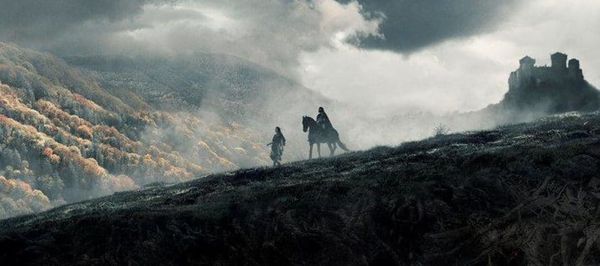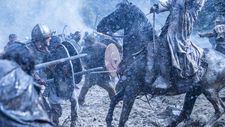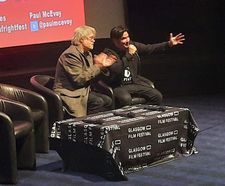 |
| Irati |
Irati was screened as part of the Frightfest strand at 2023's Glasgow Film Festival. It was originally scheduled for ten to four in the afternoon, but technical difficulties meant it couldn't be shown at that time. Instead, with no small measure of effort behind the scenes, it was shown at eleven o'clock that same evening. Frightfest screenings usually sell out near instantaneously. However porous the borders of horror are, its fans are tightly-knit in their support. That nightmare of exhibition was a happy accident for us at Eye For Film, as it meant that we were able to fit it into our schedule, and, equally luckily, fit ourselves into the cinema.
 |
| Alan Jones and Paul Urkijo Alijo in the Glasgow Film Theatre Photo: Andrew Robertson |
It was introduced by Frightfest's Alan Jones and the film's director Paul Urkijo Alijo, who were greeted by rapturous applause. There was clear gratitude from Alijo, who thanked audiences from "the bottom of [his] fucking heart". With the rescheduling, the opening of the Q&A was "It's very late and we have to start the movie," but there was time for a few questions.
The opener was about casting the eponymous Irati. Alijo explained that "The character [needed] something more deep, more expressive." While it was a first movie for some in the cast, Alijo has directed many of them before. With reference to Edurne Azkara and her role as Irati he talked about the "wildness" needed, the "magnetism" she possessed.
He talked about the process of filming, how they'd worked on a very limited budget. It was a "good budget for a medium movie," but they all wanted to make a bigger movie. In Frightfest bumpf it was described as "the Basque Lord Of The Rings" and the roots of horror through it as a fantastic, even mythic adventure story make that an apt comparison. The ambition to make a movie that feels bigger is ably fulfilled.
 |
| In the thick of battle |
There was discussion of filming a mass battle. Using a camera that moved "through the violence" meant that the fact they had "only 70 figurantes" was obscured. The fog of war can conceal to great advantage. As the story involves not just conflict but the mythological creatures of Basque country, deeply rooted in nature, one of the intents was to shoot in the wild. "Landscape adds bigness," explained Alijo, and he said that in the process of filming he had "made a deal with Mother Earth." The film took "structure with colour." They shot "everything in line," chronological order. The "first part in the green," in the other part, Autumn, everything "gold," "bucolic," informed by the fact that "nature is dying." The golden leaves were from a Basque October, and that incipient chill is palpable.
That deal bore rich rewards. "99% is everything natural." Within the filming there was "only one set." They had "six weeks exterior" shooting, and when production (and plot) went to "enter the caves..." "then RAIN". Those capitals are my best effort to mirror the emphasis Alijo put on the word, as compelling in person, it seems, as he is a film-maker. Buoyed no doubt by the energy of the very full Cinema One of Glasgow's Film Theatre, and also by the relief that the technical issues had been resolved.
 |
| Alan Jones and Paul Urkijo Alijo Photo: Andrew Robertson |
As time continued to press he was asked one final question about next projects. Repeating a key element of Irati, he said to pay attention to the end, the sense that "all that has a name exists." Basque is a old language, he continued, a lot of mythological creatures with different forms, a different way to see the world. That minded me of the Sapir-Whorf hypothesis, the notion that language informs worldview. That the two never actually worked together, that the hypothesis that bears their names is a synthesis of separate works, and that it elides the extent to which it has been popularised and developed by science fiction and fantasy. There's a "Sapir-Whorf of the third kind"... However technical one chooses to get around it, on the basis of Irati (and its enigmatic ending, born of geography), I cannot wait for more.





















